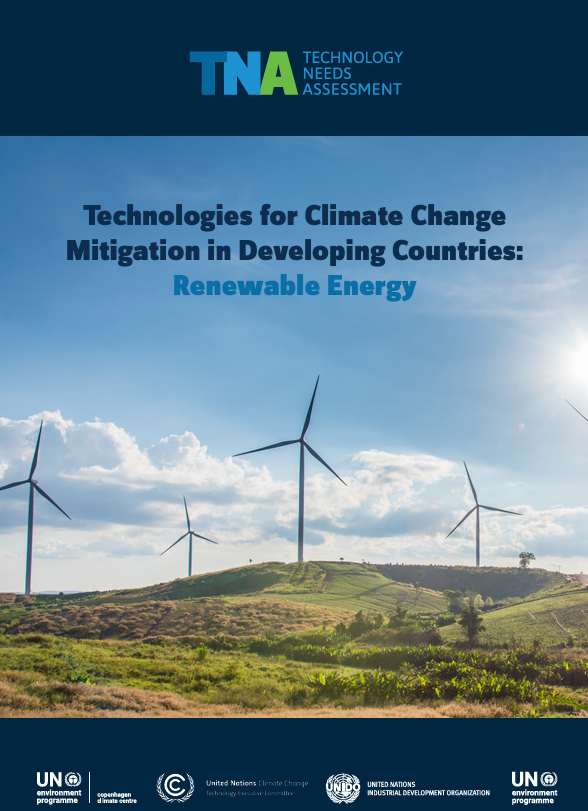The energy sector is the largest contributor to global greenhouse gas emissions. Accelerating the deployment and scaling up of zero- and low-emission energy technologies is therefore critical. The outcomes of the first global stocktake under the Paris Agreement have emphasized the pivotal role of renewable energy in achieving deep, rapid, and sustained reductions in greenhouse gas emissions, aligned with the temperature goal of the Paris Agreement.
Energy is the highest-priority sector for climate change mitigation in countries’ Technology Needs Assessments (TNAs). The energy transition lies at the core of mitigation targets outlined by Parties in their Nationally Determined Contributions (NDCs) and long-term low-emission development strategies. To support countries with dedicated guidance on mitigation technologies in the energy sector, the UNFCCC Technology Executive Committee (TEC) has partnered with the United Nations Industrial Development Organization (UNIDO) and the UNEP Copenhagen Climate Centre (UNEP-CCC) to develop a Guidebook on Renewable Energy Technologies for Climate Change Mitigation in Developing Countries.
Read more and download the guidebook here.
The Guidebook offers an overview of up-to-date information on a wide range of relevant renewable energy technologies that can be considered in the development of countries’ TNAs – either individually or in combination – depending on specific national circumstances and aligned with development and climate priorities. It is primarily intended for national TNA teams, which include national sectoral experts and stakeholders from government, non-governmental organizations, the private sector, and other relevant groups. However, it may also be useful to other practitioners working in the field.
For each renewable energy technology, the Guidebook reviews key considerations including economic assessments and affordability, mitigation and net zero emission potential, barriers to deployment, enhancing climate resilience of energy technologies, and just transition aspects. Just transition considerations can support community consultation, fair land compensation, and job creation through local hiring and training.
Launched at June Climate Meetings
On 16 June 2025 the guidebook was launched during the Technology Action Plans for Energy Systems Transformation event organized by UNFCCC in collaboration with the Technology Executive Committee (TEC), UNIDO and UNEP-CCC
The launch event of the Guidebook featured speakers from TNA countries presenting their experiences in developing and implementing TAPs, including Liberia and Brazil, as well as from key technical agencies such as the UNFCCC Secretariat, the TEC, the International Renewable Energy Agency (IRENA), Sustainable Energy for All (SE4ALL), and the United Nations Industrial Development Organization (UNIDO) and UNEP-CCC
The launch event highlighted integrated approaches to support implementation of energy sector TAPs, through finance, capacity-building, and fostering innovation.
Quotes
“The TNA guidebook on renewable energy with aspects of just transition is a valuable resource for developing country Parties to inform Paris-aligned energy systems transformations.” – Sophie De Coninck, Means of Implementation Director, UNFCCC Secretariat
“Through this guidebook, we aim to support countries in transforming their renewable energy ambitions into concrete technology action plans that are technically robust, investment-ready, and tailored to local contexts—ultimately contributing to a just, inclusive, and sustainable transformation of energy systems.” – Dietram Oppelt, Technology Executive Committee Chair
“As the global community moves toward a just and resilient energy transition, this guidebook arrives at a critical moment. It offers countries not only a clear roadmap for prioritising and deploying renewable energy technologies, but also a practical tool for embedding social equity, climate resilience, and local empowerment into national energy strategies. UNIDO is proud to contribute to this effort, supporting countries to turn ambition into action and energy innovation into inclusive, sustainable development.” – Eleonora Gatti, Head, Climate Technology Innovation Unit, Division of Climate Innovation and Montreal Protocol, UNIDO
“Delivering on the Paris Agreement requires bold and immediate action, and countries are increasingly demanding practical tools to accelerate renewable energy deployment. This new guidebook comes at exactly the right time—supporting national TNA teams with targeted, accessible knowledge to prioritize technologies that not only reduce emissions but also drive sustainable development. As UNEP and UNEP-CCC continue to support countries through the TNA process, this publication is a vital resource for turning technology needs into transformative, implementable action plans.” – Sara Trærup, TNA Global Project Coordinator and Head of Technology -Transitions and System Innovation, UNEP Copenhagen Climate Centre
